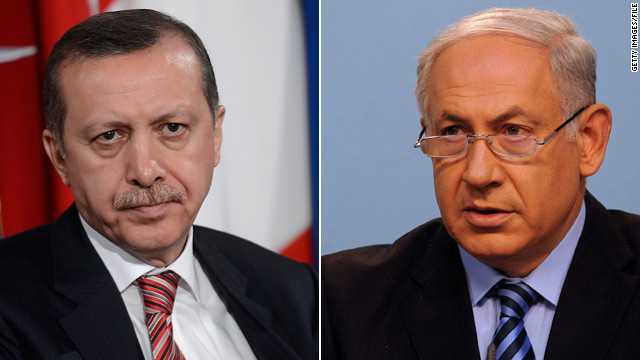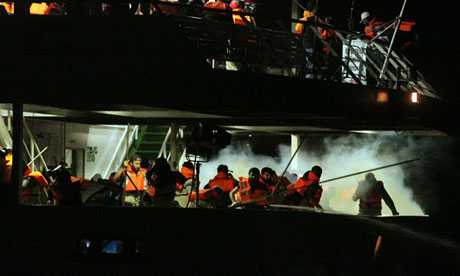
Dr. Avi Perry
Dr. Avi Perry (Fried), a talk show host at Paltalk News Network (PNN), is the author of “Fundamentals of Voice Quality Engineering in Wireless Networks,” and more recently, “72 Virgins,” a thriller about the covert war on Islamic terror. He was a VP at NMS Communications, a Bell Laboratories – distinguished staff member and manager, as well as a delegate of the US and Lucent Technologies to the ITU—the UN International Standards body in Geneva, a professor at Northwestern Universit and Intelligence expert for the Israeli Government. He may be reached through his web site www.aviperry.org
A Turkish court, on Monday May 28, 2012, formally pressed criminal charges against Israeli generals. The charges were pressed for the generals’alleged involvement in the deaths of nine Turkish nationals.
These deathsoccurred when these people tried to lynch Israeli Defense Force’s (IDF)personnel who boarded the Turkish ship, Mavi Marmara, during its attempt to break Israel’s blockade of Gaza in 2010.
Consequently, Israel is facing the following choices:
A. Send officers to Turkey to stand trial
B. Retaliate by indicting thoseTurkish officials responsible for blessing the Turkish failed incursion attempt
C. Send defense lawyers to Turkey when the trial begins with the aim of countering the charges
D. Ignore them
E. Go on a public relations blitz, trying to have the trial backfire on Turkey like a boomerang
Only two of the above fall within the set of feasible potential responses, and there is only one option that should be applied.
The idea of sending the IDF officers to Turkey to face trial is downright absurd. Since the IDF Cast Lead campaign, Turkey has been turning more hostile by the day toward Israel and warmer by the hour towards Israel’s arch enemies.
Turkey’s president, Mr. Erdogan, has become the loudest animated voice within the chorus comprising those who try to delegitimize Israel’s right to self-defense.
Sending the Mavi Marmara to Israel’s coast, in an attempt to breach the legal barrier against the Gaza-bound arms-smuggling activity, was an aggressive, malicious act designed to inflict harm on the state of Israel.
The nine Turkish nationals, who died during the Mavi Marmara incident, were the ones who declared war on the Jewish state by attempting to lynch the Israeli soldiers who boarded their ship. The Israeli soldiers had no choice but to defend themselves against their Turkish attackers. The soldiers were only guilty of protecting their own lives in self-defense under the brutal ambush aimed at lynching them—not a crime.
Sending defense lawyers to Turkey to counter the charges will undoubtedly be a futile attempt at countering a political plot, not a legal, legitimate attempt at realizing justice. Furthermore, any Israeli attorney trying to defend Israeli actions (on Turkish soil) concerning the Mavi Marmara, will, in all probability, be subject to intimidation, harassment and even life-threatening assaults. Once again, this option is not feasible.
Although retaliating by indicting those Turkish big shots responsible for blessing the failed incursion attempt will be emotionally satisfying to Israelis, it will be viewed by the rest of the world as an extravagant, rather than a legitimate, legal move. And since Israel takes pride in and is respected by its allies for its fair, objective and balanced legal system, a move to politicize it may jeopardize Israel’s reputation in this venue.
Ignoring the Turkish move has its merits. The subject will fade away from the headlines and will not be the subject of the talk around the water cooler. Still, the Turkish move may attempt to bring Interpol into the picture.This could develop into a dangerous precedent, as emphasized by former ambassador to the US, Dr. Meir Rosen, who claimed that “If Turkey gets an international arrest warrant, it may demand that all Interpol member states issue arrest warrants for Israeli officers, at least in the short term”.
This kind of development, in light of the fact that Interpol is known for its politically motivated role in arrests and deportations, is a dangerous precedent. If it sticks, then not only the indicted Israeli commanders will be unable to travel to most countries outside Israel for fear of being arrested, but future commanders may be less willing to take risks in protecting the state of Israel as a result.
The only logical option left for an Israeli response is to fight the indictment by going on a public relations blitz, trying to have the issue backfire on Turkey like a boomerang. Turkey is vulnerable. Every accusation the Turks have ever laid on Israel can rub on them directly in as significantly more pronounced way, as if the accusations were injected with steroids before reversing course and hitting the Turks in the face.
The Turks accused Israel of genocide during the Cast Lead campaign without having any proof, without looking at the evidence, without taking into account the defensive nature of the war, which attempted to end Hamas’s rocket attacks on Israeli civilians.
The Turks never considered how hard Israel had worked to protect the civilian enemy population in Gaza by avoiding shooting at enemy combatants when they surrounded themselves with human shields—has an enemy of any nation ever halted hostilities during a two-hour-lunch to allow the civil population (including the opposing fighting forces) to go out, shop for food, maintain their normal business, so life would not turn to complete hell? No one has ever fought that kind of humane battle other than Israel.

Turkey’s aggression in Cyprus… cleansed half of the island of its Greek population, creating a refugee problem that they have been failing to recognize, while continuing to occupy the cleansed land, building and expanding settlements.
 Nevertheless, Erdogan continues to deny Turkey’s role in committing genocide on its own Armenian citizens. He continues to ignoreTurkey’s aggression in Cyprus where the Turks cleansed half of the island of its Greek population, creating a refugee problem that they have been failing to recognize, while continuing to occupy the cleansed land, building and expanding settlements.
Nevertheless, Erdogan continues to deny Turkey’s role in committing genocide on its own Armenian citizens. He continues to ignoreTurkey’s aggression in Cyprus where the Turks cleansed half of the island of its Greek population, creating a refugee problem that they have been failing to recognize, while continuing to occupy the cleansed land, building and expanding settlements.
It should also be noted that while the Palestinian refugee problem was self-inflicted and should be blamed on the Arabs, the Greek Cypriot refugees were not trying to throw all Turks to the sea when they were forced out of their homes by the invading Turkish army.
And now Turkey is trying to deny Israel’s right to self-defense. Erdogan makes a mockery of international law, claiming that the sea blockade of Gaza is illegal, where in fact; all law-abiding nations including the UN, have clearly recognized the legality of that blockade, just like they did when JFK blockaded Cuba during the missile crisis in the 60s.
Israel must make the case in front of the law-abiding nations of the world that the Turks are the only guilty party in the Mavi Marmara incident, that Erdogan’s refusal to take responsibility for his country’s crimes and reckless actions has made Turkey’s judicial system a joke.
Israel should make the case that the aggressive part of the Mavi Marmara incident was not the IDF soldiers’ act of self-defense, but rather the violent attempt to breach the blockade by theTurkish government.
It was the Turkish government, that knowingly and willingly sent armed IHH members – a known terrorist group – to break Israel’s counter-terrorism blockade. It is the Turkish government whom the world should condemn. It is the Turkish legal system that the world should ridicule.
And it is Israel’s duty to push for that condemnation of Turkey and its legal system.





